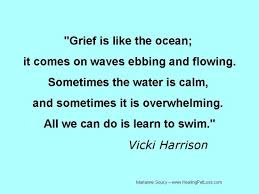
Grief is one of the most complex and unpredictable life experiences out there. It sneaks in unexpectedly and paralyzes you. It swings you wildly up and down, never knowing where then next turn is heading. Grief encompasses our whole being; the social, emotional, physical, and spiritual parts of who we are. It is important to have realistic expectations for grief work. Below are some of the realities of grief work.
- Your grief work will require more energy than you might have imagined.
- Your grief will not remain static over Grief evolves and unfolds and is, therefore, continually changing and developing.
- Your grief will have an impact on all areas of your life; social, physical, and emotional.
- Your grief will not follow a logical progression of decreasing. The grief process is much more like a roller coaster, with dramatic ups and downs, than it is a logical, step-by-step progression.
- How you grieve will depend on how you perceive the loss.
- You will grieve not only for the person who has died, but also for all of the hopes and dreams you held for the future and all of your needs that can no longer be fulfilled by the person who has died.
- Your grief will involve a wider range of feelings than those typically recognized as grief such as sadness or You may also experience guilt, anger, frustration, resentment, intolerance and irritability. There is no one, all-inclusive list of appropriate grief feelings. Remember, feelings are not good or bad, right or wrong, they just are. Give yourself permission to feel and express whatever emotions you are currently experiencing.
- This loss may trigger feelings of grief for earlier losses that were not resolved or recognized at the time of the Coming to terms with earlier unresolved losses may be part of dealing with your current loss. Look at this as an opportunity to heal old wounds and to free yourself of burdens that you may have been carrying for a long time.
- Grief usually involves an identity You will have to figure out who you are now without the person who has died.
- At times you may doubt your sanity and fear that you are going crazy.
It is important to give yourself the space and permission to grieve how you need to grieve (not how others think you should)! Some suggestions for managing the grieving process are:
- Allow yourself to cry – letting your feelings out can bring some relief
- Take time out – if you need to be alone sometimes that’s okay
- Let yourself smile – it’s okay to enjoy your memories
- Say goodbye – letting go is part of the grieving process
- Avoid bottling things up – keeping feelings to yourself may build tension inside you
- Be gentle with yourself – give yourself time to recover
- Talk to someone – sharing your feelings with someone you trust can help
- Stay healthy – eat well and stay physically




